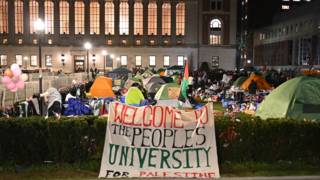
Related
The biggest voting day of the Democratic presidential primary has ended in a two-person race between former Vice President Joe Biden and Senator Bernie Sanders. With more than a third of delegates at stake, Biden swept the Midwest and the South, winning Virginia, North Carolina, Arkansas, Alabama, Tennessee, Oklahoma, Massachusetts, Minnesota and Texas. Sanders saw victories in Colorado, Utah, his home state of Vermont, and the grand prize of the night, California, where Latinx voters account for nearly 40% of the population. His campaign had 23 field offices in the state. Latinx voters could also play a key role in upcoming primaries in Arizona and Florida. We are joined by Chuck Rocha, a senior adviser to Senator Bernie Sanders’s presidential campaign who has been called the architect of Sanders’s campaign strategy to mobilize Latinx voters.
Transcript
JUAN GONZÁLEZ: The biggest voting day of the Democratic presidential primary campaign has ended in a two-person race between two candidates: former Vice President Joe Biden and Senator Bernie Sanders. With more than a third of the delegates at stake, Biden swept the Midwest and the South, winning Virginia, North Carolina, Arkansas, Alabama, Tennessee, Oklahoma, Massachusetts, Minnesota and delegate-rich Texas. Sanders saw victories in Colorado, Utah, and the Associated Press reports he is the winner of the grand prize of the night, the largest delegate state of California. He also won his home state of Vermont.
Massachusetts Senator Elizabeth Warren finished in an embarrassing third place in her home state. And New York billionaire Mike Bloomberg said he planned to reassess his candidacy, after he spent more than half a billion dollars to score just one victory — in American Samoa.
Biden delivered his victory speech in Los Angeles, where he was interrupted when two protesters with Direct Action Everywhere stormed the stage chanting, “Let dairy die.” He began his address with a much-talked-about gaffe.
JOE BIDEN: It’s a good night! It’s a good night, and it seems to be getting even better. They don’t call it Super Tuesday for nothing. By the way, this is my little sister Valerie, and I’m Jill’s husband — oh, no, this is not — no, you switched on me. This is my wife. This is my sister. They switched on me. Folks, it’s still early, but things are looking awful, awful good. … So I’m here to report we are very much alive! And make no mistake about it: This campaign will send Donald Trump packing. This campaign is taking off! Join us!
AMY GOODMAN: Meanwhile, Bernie Sanders used his speech at the end of Super Tuesday in his home state of Vermont to contrast his record with Biden and President Donald Trump.
SEN. BERNIE SANDERS: But we are not only taking on the corporate establishment, we’re taking on the political establishment. But we’re going to win because the people understand it is our campaign, our movement, which is best positioned to defeat Trump. You cannot beat Trump with the same old, same old kind of politics.
AMY GOODMAN: Sanders’ biggest win came in California. MSNBC and CNN aren’t calling it, but the Associated Press is. He won the support of some 55% of Latinx voters, who account for nearly 40% of California’s population. His campaign had 23 field offices in California alone. The Latinx community in Texas also showed up in droves for Sanders, with 39% of the vote, compared to Biden, who received 26%, though Texas went to Joe Biden. Latinx voters could also play a key role in states’ upcoming primaries in Arizona and Florida.
For more, we go to Washington, D.C., where we’re joined once again by Chuck Rocha. He’s senior adviser to Senator Bernie Sanders’ presidential campaign. He’s been called the architect of Sanders’ campaign strategy to mobilize Latinx voters.
Welcome back to Democracy Now! So, let’s begin with the big numbers. You’ve got Joe Biden winning nine states, including, well, your home state of delegate-rich Texas. You’ve got Bernie Sanders winning, well, four states, if you include California, which AP has called, the largest, the delegate-rich state of California. But this is really being called a victory for Joe Biden. They’re talking about “Joementum,” because of his surge especially among Southern African-American voters. Chuck Rocha, your analysis of what happened on Super Tuesday?
CHUCK ROCHA: There’s no doubt that Joe Biden had a good night last night, but I would argue that Bernie Sanders had a good night. This is not about who wins what state. All of your people that are watching this great program know that it’s about the delegate count. And what’s we get done counting California, we’ll be very close to where Joe Biden is, much like when we came into this race.
And we learned a lot last night. Anybody who’s worth their weight in salt will know that what you do now is you back up, you see where you did really well — you alluded to the amazing operation we’ve been running for now months and months in the Latino community — and places where we need to improve. We will reevaluate that now. We’ll look towards the states that are coming up, to make sure that we continue to put our shoulder against the wheel and empower all those grassroots activists out there that really make the difference in this campaign.
Let’s talk about one big loser last night, and that was the folks running the election system. I get sick and tired of watching good folks stand in line for hours and hours trying to represent democracy by voting. Voting in this country should not be that hard. At the richest country, at the richest in history, we should make it easy for folks to vote, and they don’t have to stand in line sometimes for three or four hours. I found that whole process disgusting last night.
JUAN GONZÁLEZ: Chuck, I wanted to ask you specifically about Texas. From what I can tell, there was maybe about twice as many people who voted in this primary for president in Texas as did in 2016. But clearly, Texas has different — it’s a huge state. In East Texas, there’s a large African-American community, in places like Houston, obviously a little further north in Dallas. What’s your sense of how the turnout and also how the state broke down versus what you expected versus what actually happened?
CHUCK ROCHA: Well, the one thing I will say for sure is the Latino vote almost single-handedly carried the state for Bernie Sanders. But overall, if you look at the African-American vote and the Latino vote, you had Bernie Sanders, who had done all this work in that community. We had been there, spent millions of dollars, empowered that community. You had an African-American community that was very, very much ginned up for Joe Biden. But overall, what I’ve been seeing, all the way back to the last midterm elections, is this anxiety with people of color and in minority communities around Donald Trump. I think Donald Trump is motivating lots of folks in diverse communities who feel threatened. There’s lots of Latinos with brown skin like me, who are U.S. citizens, who feel like we’ve been demagogued by this president, treated like a second-class citizen. That’s why you see a lot of energy out there. And I think Bernie Sanders is capturing some of that. And to give credit where credit’s due, Joe Biden has captured some of that, as well.
JUAN GONZÁLEZ: And would you say the big loser of the night appears to have been Michael Bloomberg, who staked his entire $500 million on being able to avoid the early states and then score big victories on Super Tuesday? That just didn’t happen.
CHUCK ROCHA: Well, there are some political consultants in Texas that’s already started building their second house on the amount of money they made with Michael Bloomberg, I’ll promise you that. And he threw a lot of money away in lots of states and spent lots of time in lots of places, and it just didn’t work out for him. It just goes to show that you can’t go in and buy an election. You can’t go in and try to duplicate something like our grassroots movement by paying activists on the ground. Anybody is welcome to run for president, but he stands against everything we stand for in the Bernie Sanders campaign, of raising donations $5 at a time and empowering regular Americans to be a part of this process.
AMY GOODMAN: So, NBC is reporting, Chuck, that Biden won the support of 63% of black voters in Virginia, 62% of black voters in Tennessee, 72% of black voters in Alabama. Exit polls show 6 in 10 — let’s see, 6 in 10 black voters backed Biden in Texas and North Carolina. According to NBC poll, exit poll, black voters outside of the South were less likely to support Biden, black voters under 45 around three times as likely to support Bernie Sanders than voters [45 and over]. If you can talk — I mean, you were a main architect of the Latino strategy, but you’re part of a team that is really also focusing on African-American strategy. It’s also interesting that Symone Sanders, who was one of Bernie Sanders’ top people, is now one of the top people for Joe Biden. And she is, of course, African-American.
CHUCK ROCHA: Well, let’s not forget that Joe Biden was the vice president of Barack Obama, the first black president, who made history, who was an amazing president, who is still the most popular figure in Democratic politics. So there is a piece to overcome there with that piece. That don’t mean you give up on that vote and you walk away. When I started this telecast, I said you step back now, and you evaluate what you did, and you reassess, and you change your strategy. We continue to do well with young African Americans, but we can always do better with older African Americans. These folks have come and literally are the backbone of this party, especially black women. And we want to lift up their voices and make sure they have a part of this campaign and that we’re doing this in the right way. So I think we can always improve.
JUAN GONZÁLEZ: And, Chuck, I wanted to ask you — obviously, whoever is going to be the nominee of the Democratic Party has to get 50% or more of the delegates to be nominated. So far, if you look at — Biden actually got more than 50% of the vote, I think, in two states on Tuesday, and Bernie on one, in Vermont, just over 50% of the vote there. How do you see a path to getting more than 50% of the vote? Because when you add up even the Warren folks, if you’re looking at the so-called progressive camp, if you add up the Warren votes and the Sanders votes in many of these states, they don’t quite come to 50%. So, how do you see the path to actual nomination?
CHUCK ROCHA: Well, there’s a lot of big states coming up, right? And so, there’s everything in this — if you’ve watched this primary from the beginning — and I’ve been on this particular race over a year and was with Senator Sanders back in '15 — things change quickly. And you're going to have debates. You’re going to have chances for people to back up now. The whole field has consolidated. And so, all of that is a strategic decision on resource allocation and where you’re really doubling down in certain states. With big states coming up, like Washington state, that we won last time, Michigan, Missouri, then you start looking at Florida and Arizona, and, oh my goodness, Pennsylvania, New York and all these Midwestern states, there’s all these different strategies that go in.
One thing that you should keep your eye on is that Midwest area, with lots of blue-collar, African-American, Latino, white folks who work in unions, all of the above, and around this issue of jobs and trades. A lot of these people have been hoodwinked by President Trump, and they’re looking for an alternative now, now that they see that he ain’t quite right. They want somebody that they can believe in. And Bernie Sanders has stood with them against every trade deal that sent all of their jobs overseas.
AMY GOODMAN: Now, the next group of states, almost a dozen, the majority of them went to Hillary Clinton over Bernie Sanders in 2016, which is why, although he won California — this is not winner-take-all state, as none of them are — and so they’re going to come out around even on the delegates. But he wanted a big cushion from California because of what’s coming up next, not possibly favorable to him. Do you have that same assessment?
CHUCK ROCHA: I don’t. I don’t, because we did really well in Washington, and we did really well when we shocked people in Michigan last time. So there’s two states that’s coming up immediately that the senator is very popular in. And looking down the road, this is just not the same race. And I just talked about a whole new group of people being motivated to come out because of the undertow of Donald Trump. We’re going to fight for every single vote. What really makes us different is our fundraising apparatus with our grassroots activists and those activists making phone calls and knocking on doors. We’re fixing to rotate now from the Deep South up to working in the Midwest and some of these Western states, with New York and Pennsylvania. We feel really good about all those states and our grassroots activism in those states.
AMY GOODMAN: We want to thank you so much for being with us, Chuck Rocha, senior adviser to Senator Bernie Sanders’ presidential campaign. When we come back, we look at Biden’s decisive victory with Southern African-American voters. Stay with us.












Media Options